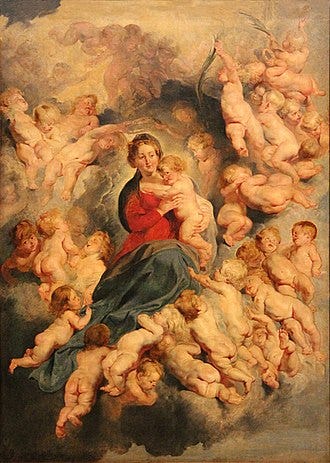Continuing on with our series on the moral vision of the Decalogue. My deepest appreciation to
, , , , and for recently becoming supporting subscribers in the recent sale.The Curious Position of Parents
The first part of the Decalogue remains a real curiosity, for the tone shifts abruptly. After four* commandments dealing with the veneration of God, the transmission of the Decalogue lurches and downshifts into the world of social relationships. We have travelled through God’s priority, God’s name, idolatry, and God’s presence in time, and then, parents and children appear.
Many explanations for the ordering of the Commandments have been offered. Patrick Miller sums up the fairly standard account this way:
Honoring parents is the logical starting point for directing human life toward the other who is not God, the other who is most often described as neighbor, but may be brother or sister and, in the Commandments, is first of all mother and father.
It is important that we see the connection here, both in what parents are and are not. When the clouds part and we are not longer with only God, the first people that it is logical to begin with are the ones who usher us into life in the world: parents. For in one sense, parents retain priority for any human life: there is no natality, no other beginnings, without this first beginning in time. All other beginnings, in an ordinary sense, begin with them, for whatever self I have is owed to that which I had no say in: the donations of parentage.
But parents are not God. They are, as Miller notes, the first among all neighbors. As I argued here, there are two categories of persons: neighbors and self, and with parents, we find that whatever sense I have of my own self is made possible by my closest neighbors, my parents.

Martin Luther, in his Large Catechism, opens up his discussion of the commandment by taking this a step further, by setting apart parents from among all other people:
To the position of fatherhood and motherhood God has given special distinction above all positions that are beneath it: He does not simply command us to love our parents but to honor them. Regarding our brothers, sisters and neighbors in general, He commands nothing more than that we love them. In this way, He separates and distinguishes father and mother from all other persons upon earth and places them at His side.
So far, so good. But for Luther, there is more here than simply a priority of love:
For it is a far higher thing to honor someone than to love someone, because honor includes not only love, but also modesty, humility, and submission to a majesty hidden in them. Honor requires not only that parents be addressed kindly and with reverence, but also that, both in heart and with the body, we demonstrate that we value them very highly, and that, next to God, we regard them as the very highest. For someone we honor from the heart we must also truly regard as high and great.
What makes parents honorable is not the execution of parenting, but the role of parent. To be a parent is to qualify to be revered, a logic Luther extends to governance. Civic governance stands in for the parent in public, and does so in a secondary place to parents:
For all authority flows and is born from the authority of parents. When the father is unable alone to educate his rebellious and irritable child, he uses a schoolmaster to teach the child. If he is too weak, he gets the help of friends and neighbors. If he departs this life, he delegates and confers his authority and government upon others who are appointed for the purpose….
But beyond this, civic governance gets its heft from the authority of parents:
From antiquity the Romans and other nations called the masters and mistresses of the household “housefathers and “housemothers”. They called their national rulers and overlords “fathers of the entire country.” This is a great shame to us who would be Christians because we do not give them the same title or, at least, do not value and honor them as fathers.
The legacy of Luther in this respect is tricky: families retain pride of place within a society, as the first among neighbors and the entrance point for all natality. And yet, by analogy, the office of magistrate is due respect because they are “fathers of the entire country”. I think you can see this going. Government bears its authority by analogy to the parent, but when this theological relation is absent, parentes comes into conflict with in loco parentes.
The Destabilizing Force of the Family
There is much yet to be said about this commandment: about the difficulty of families, about the relation of children to parents. But let us stay with this point today. In establishing so strongly the place of parents as not just having a priority of love, but of honor, Luther’s account of families creates an intriguing destabilization of society, for whatever authority that a society depends on this one truth: societies do not create. Societies do not yet beget people, as much as they might shape people.
Already, technological efforts are available which may obviate this distinction. Consider, for example, the artificial womb. Once considered a futuristic plot device, similar devices have been shown to have promise in gestating other animals outside the womb. Behold, a wombless lamb:
Arguments over these devices center on whether these kinds of devices are just, providing birth opportunities for those who cannot carry a child to term. Lost is Luther’s concern, that the appearance of new life is as close to the wonder of Genesis 1 as the world can get. Such a capacity is worth honoring, distinguishing (though not separating entirely) from all other neighbors.
Families, in being the place of where natality happens, thus gain priority morally and politically in ways that societies do not. For any parentage which governments have depends on their having been given it by families, both by analogy and by the limits of what a particular family can do.
In this season of Advent, it is wholly appropriate to contemplate the role that parentage plays. For there too, the sheer natality of God comes into conflict with the natality of Herod: one gives life as a sheer gift, and one constrains the conditions under which natality can happen. Once the Child is born, this conflict does not end: the Holy Child stands as the image of God’s Beginning in flesh, and Herod stands as the image of natality usurped, putting to death children for being children.
At Christmas, though, the priority which Luther gives to parents is called into question. For are parents here those who bear witness to God’s creation, or are parents the ones who mirror God’s creative agency? The coming of the Word into flesh—the child among children—puts a question mark even on the authority of parents, though not undoing this weight entirely.
It is to this part of the puzzle that we will turn next.






You know that I've watched loads of ruthless horror films, but that "wombless lamb" is cuss-wordly revolting.
It is striking that we learn how to "honor", in general, by choosing to honor the people most easy to take for granted. In such, we train our souls (and affections) to honor God, who also is easy to take for granted. From here we can begin truly to honor neighbors, who are just downright easy to overlook--both unintentionally and intentionally.